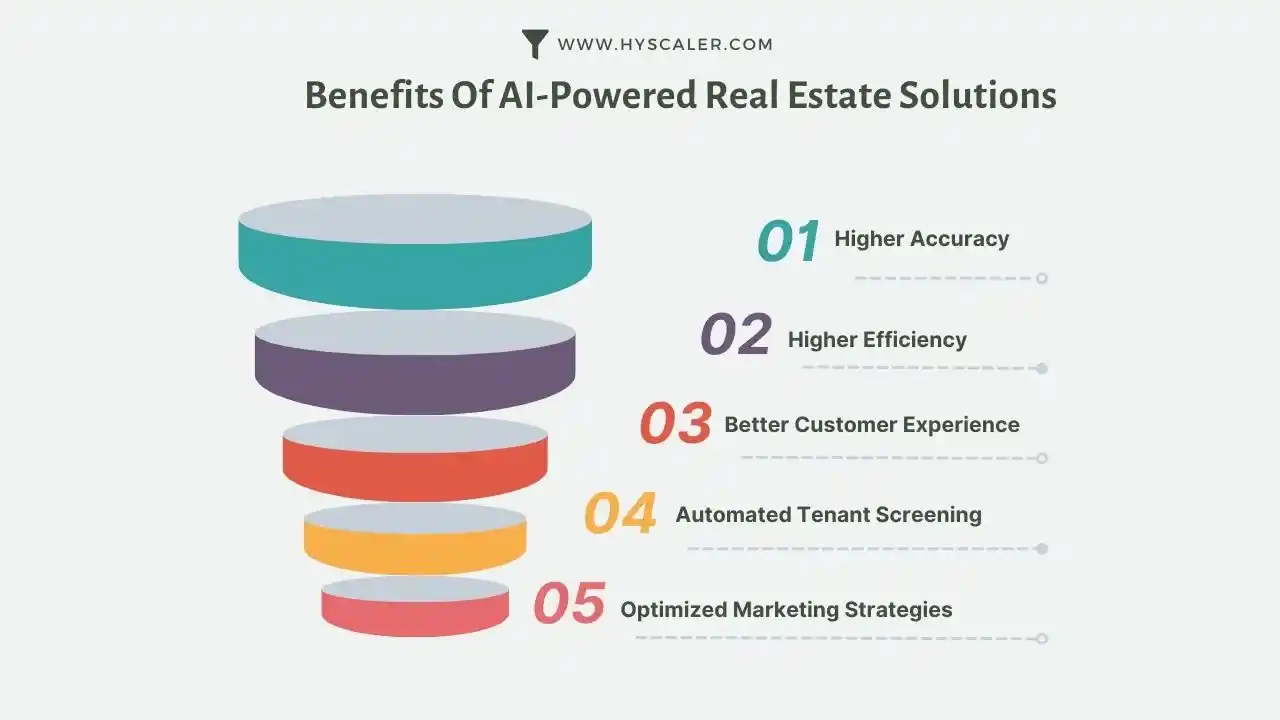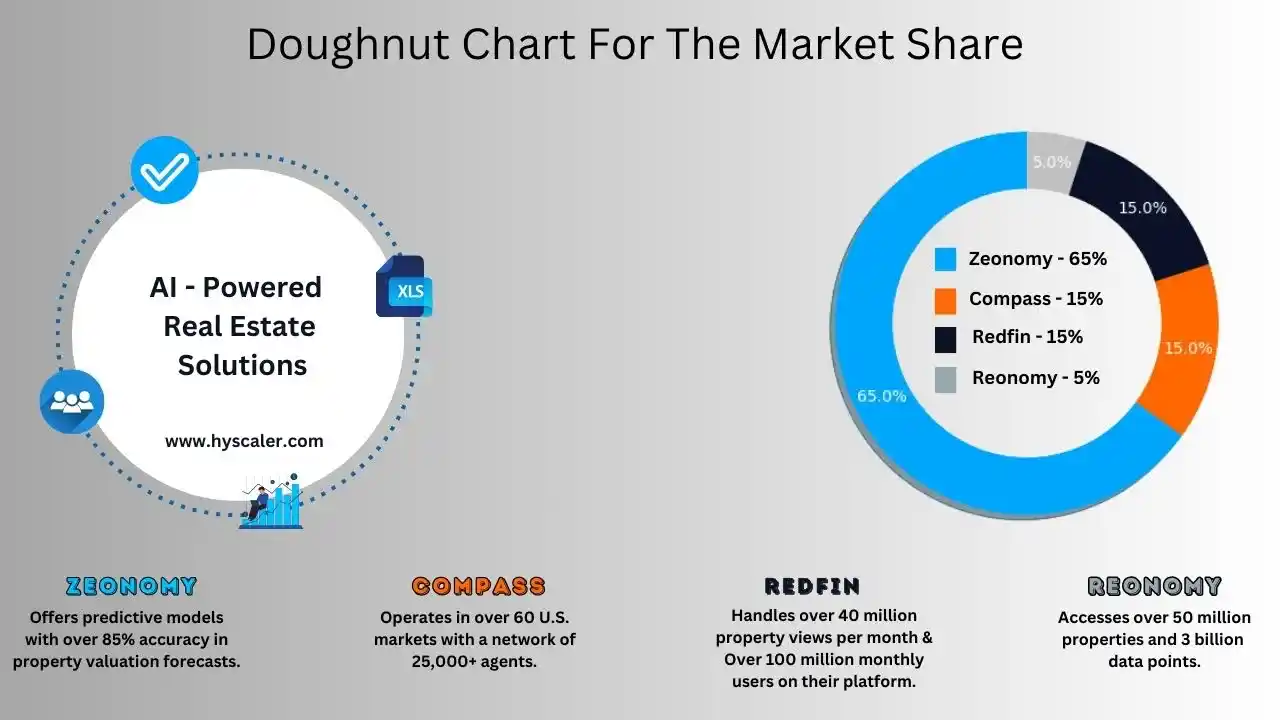Table of Contents
Imagine a world where finding your dream home is as easy as chatting with a friend. The residential real estate industry, long dominated by traditional practices, is now on the cusp of an AI revolution that promises to transform every aspect of how we buy, sell, and manage property.
Historically, the residential real estate industry was focused on traditional practices and driven by very manual processes but an Artificial Intelligence (AI) tsunami is set to crash over how things are done currently. The world is becoming more digitized by the day, and in real estate, AI will no longer remain an ancillary but a primary force of innovation & efficiency as we foray further into time.
The way it’s already changing the face of property management, sales, and development so its integration into other areas is almost inevitable because as businesses begin to understand VR/AR more fully they will adapt how consumers interact with their market.
Top 5 AI Applications Transforming Real Estate
- Predictive Analytics: Forecast market trends with greater accuracy, helping agents and investors make smarter decisions.
- Smart Building Technology: AI optimizes energy use, predicts maintenance needs, and enhances residents’ quality of life.
- AI Virtual Assistants: Instant responses to inquiries, AI-driven virtual tours, and augmented reality experiences redefine property sales; tools like ProProfs Chat‘s AI chatbot can streamline lead qualification and enhance customer engagement for real estate businesses.
- Automated Document Processing: Efficiency handling contracts, leases, and legal documents with AI solutions that limit errors, and speed up processing times while staying compliant.
- AI-Enabled Tenant Screening and Risk Assessment: Provides analytical capabilities to analyze tenant applications, credit histories, and behavioral patterns to support the case of a complete risk assessment for owners helping them with better selection of tenants and decreasing overall vacancy rates.
Benefits of AI-Powered Real Estate Solutions

There are numerous applications of AI in real estate that increase efficiency, and accuracy while giving customers a better experience.
- Higher Accuracy: AI minimizes human error since it processes and analyzes datasets to a much larger degree with precision, leading to more accurate outcomes.
- Higher Efficiency: AI automates redundant operational tasks, saving real estate professionals time and reducing their manual workload.
- Better Customer Experience: AI facilitates more personalized services through the customization of offerings according to the individual needs and behaviors of customers.
- Automated Tenant Screening: AI makes tenant screening automatic by scrutinizing credit scores, rental records, and social media, therefore hastening the evaluation process and making it more reliable.
- Optimized Marketing Strategies: AI finds the right channels and messages to communicate with buyers or tenants by taking into account the data. For example, AI-driven marketing can target potential buyers looking for tiny homes for sale in Kentucky or traditional homes for sale in Springfield OR, ensuring that listings reach the right audience and increasing the rate of transaction success with reduced marketing costs. Therefore, it’s bound to increase the rate of transaction success with reduced marketing costs.
AI Leaders in Real Estate: A Competitive Landscape Analysis
As AI is reshaping the real estate business, some of the top companies in the business, including Zillow, Redfin, and Compass, are leading the way. Learn exactly how each of these companies uniquely uses artificial intelligence to lead them through a competitive landscape: from personalized home search algorithms to AI-driven customer relationship management. Whether you’re looking for insights on AI innovations or the role of a VA for Real Estate , this guide covers it all.
Zillow Group – Zillow puts AI into action for the betterment of property search capabilities and provides an estimated home value through their well-known “Zestimate” feature. They make use of AI for personalized recommendations, focused ad serving, and engagement rate optimization on their platform.
Traditional property valuation methods often suffer from inefficiencies and subjectivity. According to Zillow, the Zestimate for on-market homes has a nationwide median error rate of 2.4%, underscoring the challenges in achieving consistent and accurate property valuations.
Redfin – Redfin leverages the power of AI to make the process of buying a home easier by providing AI-driven home tours, real-time market analysis, and price-strategy recommendations. The tools are made to enhance the consumer experience and operational efficiency on their platform.
Compass – Compass integrates AI into the platform for pricing, marketing, and property searches that real estate brokers need. Its AI-driven CRM tools are developed to optimize interactions between agents and clients, increasing the productivity of agents and customer satisfaction.
Reonomy – Reonomy differentiates itself by focusing on the breadth and depth of its data coverage, the integration of AI-driven insights, and its ability to streamline the research and decision-making processes for Commercial Real Estate professionals.

Navigating AI Challenges in Real Estate: Addressing Privacy, Bias, and Cost
But with great power comes great responsibility. As AI continues to integrate into real estate, concerns about data privacy and algorithmic bias can’t be ignored. How do we ensure that this powerful technology serves everyone fairly, without compromising on ethics?
While AI has a lot of potential use cases, many challenges exist in adopting it for real estate. One such concern is information privacy. AI needs an enormous amount of data to work properly, which is what causes some concern over how that information is being collected and used. The distinction between using data to improve services and respecting the privacy rights of individuals is crucial.
A major problem is also the risk of reinforcing biases in real estate through AI. AI systems can perpetuate or even amplify these biases if the data it was trained on is itself biased and contains patterns of race/gender/socioeconomic bias. This results in bad practices like selective tenant screening, or even discriminatory pricing.
On top of this, the implementation costs and complexity that may come with implementing AI solutions are a barrier for smaller real estate firms. Although such corporations may find themselves in a position to invest money into AI, many smaller businesses simply cannot afford the kind of technology and experience it requires. Never lose sight of the fact this could create a divergent environment between bigger and smaller players and, at worst an escalation in consolidation.
AI in Real Estate: What Users Think—Opportunities and Concerns
AI is revolutionizing real estate, but what does that mean for you? Whether you’re excited about the possibilities or concerned about job displacement, your opinion matters. Join the conversation and share your thoughts on how AI is shaping the future of real estate.
- Though AI in real estate still triggers reactions on various spectrums; some are thrilled by the progress whereas others remain skeptical.
- AI has industry experts excited about its capacity to disrupt real estate operations.
- The application of AI in real estate has increased, and it is interesting to note that the investment in AI is increasing, just as well!
- Worrying about the specter of AI slipping in and replacing jobs whether truck drivers or white-collar workers like those typing away at data entry and customer service desks continues to haunt us.
- Who Owns the Future? by Jaron Lanier, contends that AI can only create fresh paths forward in fields dependent on people doing creative and judgment-based work.
- Ethical AI is becoming a greater focus as well, with more calls for transparency in how AIs are developed and used.
- The conversation around ethical implications and responsible AI use in real estate is transitioning from the fringes and into the forefront of discussions among consumers, professionals, developers as well as aliens like regulators.
AI-Driven Data Metrics: Transforming Real Estate Insights and Efficiency

- Market Forecasting Accuracy: Current methods have a 70–75% level of accuracy. AI could elevate it to more than 90 percent which would be an advantage for both the agents and investors in making their decisions.
- Late-Stage Pipeline: There is currently a 50% uplift on deals in late-stage opportunities for closed contracts. With the help of AI, this can be brought down to 30-40 days with tasks that are automated and predictive insights on top of it.
- Property Management Cost Savings: Traditional systems save 10–15% on energy costs. With the use of AI, the savings would go up to 40-45% with smart building technology, but there is a powerful resource to boost it even further.
- Poor tenant screening efficiency: The manual process has 85% accuracy and takes 2-3 weeks. AI could reduce the processing to 1-3 days and achieve an accuracy of approximately 95–98%.
- Marketing ROI: Traditional campaigns have a 3-4x ROI. AI could increase this to 6-8x by optimizing channels and personalizing outreach.
- Earlier Customer Satisfaction percentages: Current satisfaction is around 70-75%. With the potential for AI to raise it up and beyond 85-90% by personalized services.
- Real Estate Investment Returns: Current returns are 7-8%. AI could increase them to 10-12% through optimized investment strategies.
- Costs: Around 20-25% of a firm’s budget goes to operations. This could fetch a 15-20% reduction by deploying AI, and that is what can be urged to allow more resources for growth.
- Current Adoption Rate in Real Estate: Currently, 25-30% of firms use AI. By 2030, over 70% are expected to fully integrate AI into their operations
The Future of Real Estate: How AI Will Shape Smart Cities and Beyond

The future of real estate is not just smart—it’s visionary. AI-powered platforms will soon bring together everything from property management to urban planning under one intelligent system, making our cities smarter, more sustainable, and better places to live. Imagine a city where your home adapts to your needs, and the streets themselves learn from your daily routines.
- AI is expected to significantly increase in terms of what it can do for the real estate sector.
- As the technology starts to play catch up, AI-powered platforms hold great potential in unifying numerous tiers of real estate operations within one modal layer.
- These AI-driven operations could be used in property management, maintenance & marketing/selling processes on any of these platforms.
- Smart Cities with AI and developing Applications of Artificial Intelligence in real estate are made possible by the Technologies.
- Improving quality of life: With AI in urban living, it is possible to have cities that are better places for humans and the environment with more sustainable use of resources.
- For instance, analyzing data from multiple sources to aid in traffic control mechanisms, public security, or energy distribution and waste management in an urban context.
Conclusion
We Are Writing The Future of Real Estate, And AI Is Holding the Pen. The impact and power of AI technology will be determined by those who harness it wisely, whether they change an industry or improve the lives of everyone. The future is not simply about being competitive, it’s an opportunity to steer in a new age, one where technology and human ingenuity meet up head-to-head to form agile communities that uplift each other as we re-imagine what can be achieved.
And the real question is — are you ready to lead this transformation and leave your mark? The fear, on the other hand- will retain you and be stagnant; The imaginative roots are looking for a touch of light to discover their way out. Ready to explore how AI can transform your real estate business? Contact us today for a consultation or explore our AI-driven solutions to see how we can help you stay ahead of the curve.